- Home
- Connie Willis
Fire Watch Page 2
Fire Watch Read online
Page 2
I must also accomplish the purpose of this practicum, whatever it may be. Right now the only purpose I care about is staying alive until the second letter from uncle arrives and I can go home.
I am doing make-work until Langby has time to “show me the ropes.” I’ve cleaned the skillet they cook the foul little fishes in, stacked wooden folding chairs at the altar end of the crypt (flat instead of standing because they tend to collapse like bombs in the middle of the night), and tried to sleep.
I am apparently not one of the lucky ones who can sleep through the raids. I spent most of the night wondering what St. Paul’s risk rating is. Practica have to be at least a six. Last night I was convinced this was a ten, with the crypt as ground zero, and that I might as well have applied for Denver.
The most interesting thing that’s happened so far is that I’ve seen a cat. I am fascinated, but trying not to appear so, since they seem commonplace here.
September 22—Still in the crypt. Langby comes dashing through periodically cursing various government agencies (all abbreviated) and promising to take me up on the roofs. In the meantime I’ve run out of make-work and taught myself to work a stirrup pump. Kivrin was overly concerned about my memory retrieval abilities. I have not had any trouble so far. Quite the opposite. I called up fire-fighting information and got the whole manual with pictures, including instructions on the use of the stirrup pump. If the kippers set Lord Nelson on fire, I shall be a hero.
Excitement last night. The sirens went early and some of the chars who clean offices in the City sheltered in the crypt with us. One of them woke me out of a sound sleep, going like an air raid siren. Seems she’d seen a mouse. We had to go whacking at tombs and under the cots with a rubber hoot to persuade her it was gone. Obviously what the history department had in mind: murdering mice.
September 24—Langby took me on rounds. Into the choir, where I had to learn the stirrup pump all over again, assigned rubber boots and a tin helmet. Langby says Commander Allen is getting us asbestos firemen’s coats, but hasn’t yet, so it’s my own wool coat and muffler and very cold on the roofs even in September. It feels like November and looks it, too, bleak and cheerless with no sun. Up to the dome and onto the roofs, which should be flat but in fact are littered with towers, pinnacles, gutters, statues, all designed expressly to catch and hold incendiaries out of reach. Shown how to smother an incendiary with sand before it burns through the roof and sets the church on fire. Shown the ropes (literally) lying in a heap at the base of the dome in case somebody has to go up one of the west towers or over the top of the dome. Back inside and down to the Whispering Gallery.
Langby kept up a running commentary through the whole tour, part practical instruction, part church history. Before we went up into the Gallery he dragged me over to the south door to tell me how Christopher Wren stood in the smoking rubble of Old St. Paul’s and asked a workman to bring him a stone from the graveyard to mark the cornerstone. On the stone was written in Latin, “I shall rise again,” and Wren was so impressed by the irony that he had the word inscribed above the door. Langby looked as smug as if he had not told me a story every first-year history student knows, but I suppose without the impact of the fire watch stone, the other is just a nice story.
Langby raced me up the steps and onto the narrow balcony circling the Whispering Gallery. He was already halfway round to the other side, shouting dimensions and acoustics at me. He stopped facing the wall opposite and said softly, “You can hear me whispering because of the shape of the dome. The sound waves are reinforced around the perimeter of the dome. It sounds like the very crack of doom up here during a raid. The dome is one hundred and seven feet across. It is eighty feet above the nave.”
I looked down. The railing went out from under me and the black-and-white marble floor came up with dizzying speed. I hung onto something in front of me and dropped to my knees, staggered and sick at heart. The sun had come out, and all of St. Paul’s seemed drenched in gold. Even the carved wood of the choir, the white stone pillars, the leaden pipes of the organ, all of it golden, golden.
Langby was beside me, trying to pull me free. “Bartholomew,” he shouted, “what’s wrong? For God’s sake, man.”
I knew I must tell him that if I let go, St. Paul’s and all the past would fall in on me, and that I must not let that happen because I was an historian. I said something, but it was not what I intended because Langby merely tightened his grip. He hauled me violently free of the railing and back onto the stairway; then let me collapse limply on the steps and stood back from me, not speaking.
“I don’t know what happened in there,” I said. “I’ve never been afraid of heights before.”
“You’re shaking,” he said sharply “You’d better lie down.” He led me back to the crypt.
September 25—Memory retrieval: ARP manual. Symptoms of bombing victims. Stage one—shock; stupefaction; unawareness of injuries; words may not make sense except to victim. Stage two—shivering; nausea; injuries, losses felt; return to reality Stage three—talkativeness that cannot be controlled; desire to explain shock behavior to rescuers.
Langby must surely recognize the symptoms, but how does he account for the fact there was no bomb? I can hardly explain my shock behavior to him, and it isn’t just the sacred silence of the historian that stops me.
He has not said anything, in fact assigned me my first watches for tomorrow night as if nothing had happened, and he seems no more preoccupied than anyone else. Everyone I’ve met so far is jittery (one thing I had in short-term was how calm everyone was during the raids) and the raids have not come near us since I got here. They’ve been mostly over the East End and the docks.
There was a reference tonight to a UXB, and I have been thinking about the Dean’s manner and the church being closed when I’m almost sure I remember reading it was open through the entire Blitz. As soon as I get a chance, I’ll try to retrieve the events of September. As to retrieving anything else, I don’t see how I can hope to remember the right information until I know what it is I am supposed to do here, if anything.
There are no guidelines for historians, and no restrictions either. I could tell everyone I’m from the future if I thought they would believe me. I could murder Hitler if I could get to Germany. Or could I? Time paradox talk abounds in the history department, and the graduate students back from their practica don’t say a word one way or the other. Is there a tough, immutable past? Or is there a new past every day and do we, the historians, make it? And what are the consequences of what we do, if there are consequences? And how do we dare do anything without knowing them? Must we interfere boldly hoping we do not bring about all our downfalls? Or must we do nothing at all, not interfere, stand by and watch St. Paul’s burn to the ground if need be so that we don’t change the future?
All those are fine questions for a late-night study session. They do not matter here. I could no more let St. Paul’s burn down than I could kill Hitler. No, that is not true. I found that out yesterday in the Whispering Gallery. I could kill Hitler if I caught him setting fire to St. Paul’s.
September 26—I met a young woman today. Dean Matthews has opened the church, so the watch have been doing duties as chars and people have started coming in again. The young woman reminded me of Kivrin, though Kivrin is a good deal taller and would never frizz her hair like that. She looked as if she had been crying. Kivrin has looked like that since she got back from her practicum. The Middle Ages were too much for her. I wonder how she would have coped with this. By pouring out her fears to the local priest, no doubt, as I sincerely hoped her look-alike was not going to do.
“May I help you?” I said, not wanting in the least to help. “I’m a volunteer.”
She looked distressed. “You’re not paid?” she said, and wiped at her reddened nose with a handkerchief. “I read about St. Paul’s and the fire watch and all, and I thought perhaps there’s a position there for me. In the canteen, like, or something. A paying position.” T
here were tears in her red-rimmed eyes.
“I’m afraid we don’t have a canteen,” I said as kindly as I could, considering how impatient Kivrin always makes me, “and it’s not actually a real shelter. Some of the watch sleep in the crypt. I’m afraid we’re all volunteers, though.”
“That won’t do, then,” she said. She dabbed at her eyes with the handkerchief. “I love St. Paul’s, but I can’t take on volunteer work, not with my little brother Tom back from the country.” I was not reading this situation properly. For all the outward signs of distress she sounded quite cheerful and no closer to tears than when she had come in. “I’ve got to get us a proper place to stay. With Tom back, we can’t go on sleeping in the tubes.”
A sudden feeling of dread, the kind of sharp pain you get sometimes from involuntary retrieval, went over me. “The tubes?” I said, trying to get at the memory.
“Marble Arch, usually,” she went on. “My brother Tom saves us a place early and I go …” She stopped, held the handkerchief close to her nose, and exploded into it. “I’m sorry,” she said, “this awful cold!”
Red nose, watering eyes, sneezing. Respiratory infection. It was a wonder I hadn’t told her not to cry. It’s only by luck that I haven’t made some unforgivable mistake so far, and this is not because I can’t get at the long-term memory. I don’t have half the information I need even stored: cats and colds and the way St. Paul’s looks in full sun. It’s only a matter of time before I am stopped cold by something I do not know. Nevertheless, I am going to try for retrieval tonight after I come off watch. At least I can find out whether and when something is going to fall on me.
I have seen the cat once or twice. He is coal-black with a white patch on his throat that looks as if it were painted on for the blackout.
September 27—I have just come down from the roofs. I am still shaking.
Early in the raid the bombing was mostly over the East End. The view was incredible. Searchlights everywhere, the sky pink from the fires and reflecting in the Thames, the exploding shells sparkling like fireworks. There was a constant, deafening thunder broken by the occasional droning of the planes high overhead, then the repeating stutter of the ack-ack guns.
About midnight the bombs began falling quite near with a horrible sound like a train running over me. It took every bit of will I had to keep from flinging myself flat on the roof, but Langby was watching. I didn’t want to give him the satisfaction of watching a repeat performance of my behavior in the dome. I kept my head up and my sand bucket flrmly in hand and felt quite proud of myself.
The bombs stopped roaring past about three, and there was a lull of about half an hour, and then a clatter like hail on the roofs. Everybody except Langby dived for shovels and stirrup pumps. He was watching me. And I was watching the incendiary.
It had fallen only a few meters from me, behind the clock tower. It was much smaller than I had imagined, only about thirty centimeters long. It was sputtering violently, throwing greenish-white fire almost to where I was standing. In a minute it would simmer down into a molten mass and begin to burn through the roof. Flames and the frantic shouts of firemen, and then the white rubble stretching for miles, and nothing, nothing left, not even the fire watch stone.
It was the Whispering Gallery all over again. I felt that I had said something, and when I looked at Langby’s face he was smiling crookedly.
“St. Paul’s will burn down,” I said. “There won’t be anything left.”
“Yes,” Langby said. “That’s the idea, isn’t it? Burn St. Paul’s to the ground? Isn’t that the plan?”
“Whose plan?” I said stupidly.
“Hitler’s, of course,” Langby said. “Who did you think I meant?” and, almost casually, picked up his stirrup pump.
The page of the ARP manual flashed suddenly before me. I poured the bucket of sand around the still sputtering bomb, snatched up another bucket and dumped that on top of it. Black smoke billowed up in such a cloud that I could hardly find my shovel. I felt for the smothered bomb with the tip of it and scooped it into the empty bucket, then shoveled the sand in on top of it. Tears were streaming down my face from the acrid smoke. I turned to wipe them on my sleeve and saw Langby.
He had not made a move to help me. He smiled. “It’s not a bad plan, actually. But of course we won’t let it happen. That’s what the fire watch is here for. To see that it doesn’t happen. Right, Bartholomew?”
I know now what the purpose of my practicum is. I must stop Langby from burning down St. Paul’s.
September 28—I try to tell myself I was mistaken about Langby last night, that I misunderstood what he said. Why would he want to burn down St. Paul’s unless he is a Nazi spy? How can a Nazi spy have gotten on the fire watch? I think about my faked letter of introduction and shudder.
How can I find out? If I set him some test, some fatal thing that only a loyal Englishman in 1940 would know, I fear I am the one who would be caught out. I must get my retrieval working properly.
Until then, I shall watch Langby. For the time being at least that should be easy. Langby has just posted the watches for the next two weeks. We stand every one together.
September 30—I know what happened in September. Langby told me.
Last night in the choir, putting on our coats and boots, he said, “They’ve already tried once, you know.”
I had no idea what he meant. I felt as helpless as that first day when he asked me if I was from the ayarpee.
“The plan to destroy St. Paul’s. They’ve already tried once. The tenth of September. A high explosive bomb. But of course you didn’t know about that. You were in Wales.”
I was not even listening. The minute he had said “high explosive bomb,” I had remembered it all. It had burrowed in under the road and lodged on the foundations. The bomb squad had tried to defuse it, but there was a leaking gas main. They decided to evacuate St. Paul’s, but Dean Matthews refused to leave, and they got it out after all and exploded it in Barking Marshes. Instant and complete retrieval.
“The bomb squad saved her that time,” Langby was saying. “It seems there’s always somebody about.”
“Yes,” I said, “there is,” and walked away from him.
October 1—I thought last night’s retrieval of the events of September tenth meant some sort of breakthrough, but I have been lying here on my cot most of the night trying for Nazi spies in St. Paul’s and getting nothing. Do I have to know exactly what I’m looking for before I can remember it? What good does that do me?
Maybe Langby is not a Nazi spy. Then what is he? An arsonist? A madman? The crypt is hardly conducive to thought, being not at all as silent as a tomb. The chars talk most of the night and the sound of the bombs is muffled, which somehow makes it worse. I find myself straining to hear them. When I did get to sleep this morning, I dreamed about one of the tube shelters being hit, broken mains, drowning people.
October 4—I tried to catch the cat today. I had some idea of persuading it to dispatch the mouse that has been terrifying the chars. I also wanted to see one up close. I took the water bucket I had used with the stirrup pump last night to put out some burning shrapnel from one of the antiaircraft guns. It still had a bit of water in it, but not enough to drown the cat, and my plan was to clamp the bucket over him, reach under, and pick him up, then carry him down to the crypt and point him at the mouse. I did not even come close to him.
I swung the bucket, and as I did so, perhaps an inch of water splashed out. I thought I remembered that the cat was a domesticated animal, but I must have been wrong about that. The eat’s wide complacent face pulled back into a skull-like mask that was absolutely terrifying, vicious claws extended from what I had thought were harmless paws, and the cat let out a sound to top the chars.
In my surprise I dropped the bucket and it rolled against one of the pillars. The cat disappeared. Behind me, Langby said, “That’s no way to catch a cat.”
“Obviously,” I said, and bent to retrieve the
bucket.
“Cats hate water,” he said, still in that expressionless voice.
“Oh,” I said, and started in front of him to take the bucket back to the choir. “I didn’t know that.”
“Everybody knows it. Even the stupid Welsh.”
October 8—We have been standing double watches for a week—bomber’s moon. Langby didn’t show up on the roofs, so I went looking for him in the church. I found him standing by the west doors talking to an old man. The man had a newspaper tucked under his arm and he handed it to Langby, but Langby gave it back to him. When the man saw me, he ducked out. Langby said, “Tourist. Wanted to know where the Windmill Theater is. Read in the paper the girls are starkers.”
I know I looked as if I didn’t believe him because he said, “You look rotten, old man. Not getting enough sleep, are you? I’ll get somebody to take the first watch for you tonight.”
“No,” I said coldly. “I’ll stand my own watch. I like being on the roofs,” and added silently, where I can watch you.
He shrugged and said, “I suppose it’s better than being down in the crypt. At least on the roofs you can hear the one that gets you.”
October 10—I thought the double watches might be good for me, take my mind off my inability to retrieve. The watched-pot idea. Actually, it sometimes works. A few hours of thinking about something else, or a good night’s sleep, and the fact pops forward without any prompting, without any artificials.
The good night’s sleep is out of the question. Not only do the chars talk constantly, but the cat has moved into the crypt and sidles up to everyone, making siren noises and begging for kippers. I am moving my cot out of the transept and over by Nelson before I go on watch. He may be pickled, but he keeps his mouth shut.
October 11—I dreamed Trafalgar, ships’ guns and smoke and falling plaster and Langby shouting my name. My first waking thought was that the folding chairs had gone off. I could not see for all the smoke.

 Passage
Passage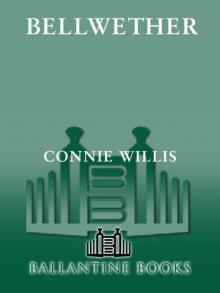 Bellwether
Bellwether Blackout
Blackout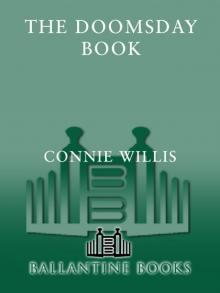 Doomsday Book
Doomsday Book A Lot Like Christmas: Stories
A Lot Like Christmas: Stories Water Witch
Water Witch To Say Nothing of the Dog
To Say Nothing of the Dog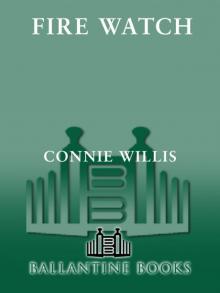 Fire Watch
Fire Watch The Winds of Marble Arch and Other Stories
The Winds of Marble Arch and Other Stories Uncharted Territory
Uncharted Territory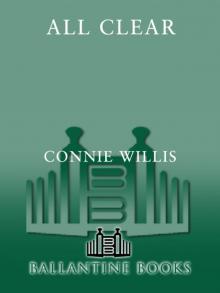 All Clear
All Clear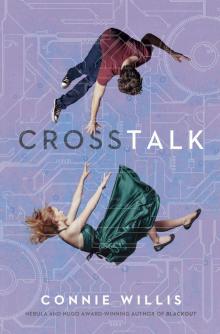 Crosstalk
Crosstalk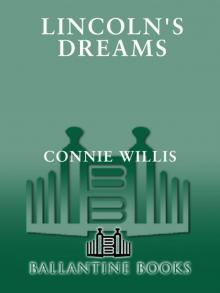 Lincoln's Dreams
Lincoln's Dreams Miracle and Other Christmas Stories
Miracle and Other Christmas Stories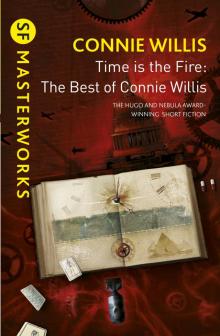 Time is the Fire
Time is the Fire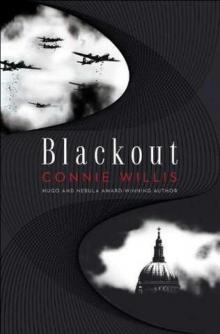 Blackout ac-1
Blackout ac-1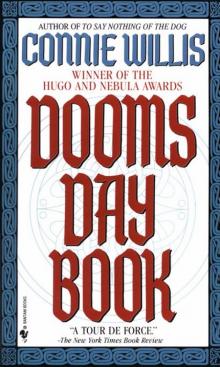 Dooms Day Book
Dooms Day Book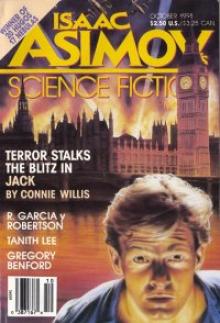 Jack
Jack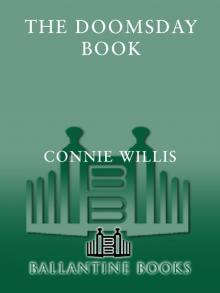 The Doomsday Book
The Doomsday Book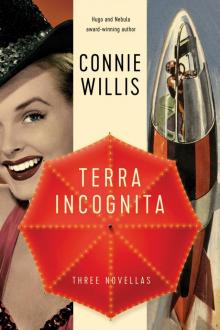 Terra Incognita
Terra Incognita The Best of Connie Willis
The Best of Connie Willis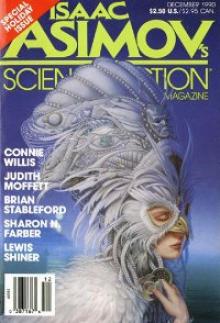 Cibola
Cibola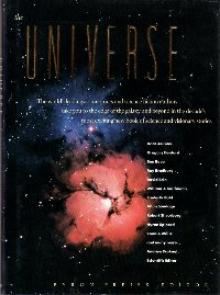 Schwarzschild Radius
Schwarzschild Radius Even the Queen
Even the Queen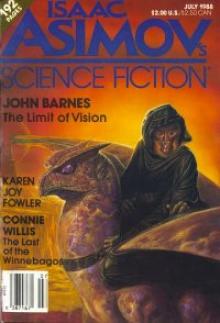 The Last of the Winnebagos
The Last of the Winnebagos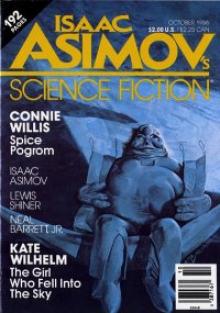 Spice Pogrom
Spice Pogrom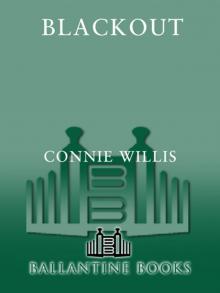 Oxford Time Travel 1 - Blackout
Oxford Time Travel 1 - Blackout At The Rialto
At The Rialto A Lot Like Christmas
A Lot Like Christmas